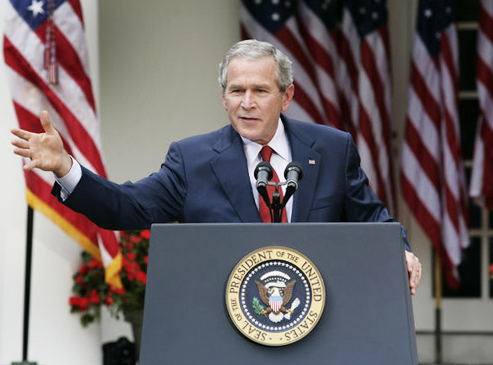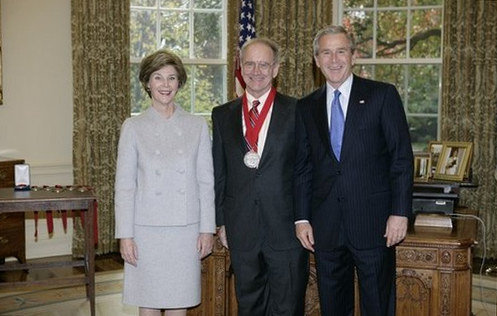|
Bush Doctrine
The Bush Doctrine refers to multiple interrelated foreign policy principles of the 43rd President of the United States, George W. Bush. These principles include unilateralism, preemptive war, and regime change. Charles Krauthammer first used the phrase in June 2001 to describe the Bush administration's "unilaterally withdrawing from the ABM treaty and rejecting the Kyoto protocol." According to Charles Krauthammer, who was the first to use it in June 2001, the phrase has had four distinct meanings, each one succeeding another over the eight years of the George W. Bush presidency: firstly, unilateralism, i.e., unilaterally withdrawing from the Anti-Ballistic Missile Treaty and rejecting the Kyoto Protocol; secondly, after 9-11-2001, the "with us or against us" policy on terror; thirdly, a doctrine of pre-emptive war, e.g., Iraq; and fourthly, the idea that the fundamental mission of American foreign policy is to spread democracy throughout the world. After the 9/11 attack, ... [...More Info...] [...Related Items...] OR: [Wikipedia] [Google] [Baidu] |
Unilaterally
__NOTOC__ Unilateralism is any doctrine or agenda that supports one-sided action. Such action may be in disregard for other parties, or as an expression of a commitment toward a direction which other parties may find disagreeable. As a word, ''unilateralism'' is attested from 1926, specifically relating to unilateral disarmament. The current, broader meaning emerges in 1964. It stands in contrast with multilateralism, the pursuit of foreign policy goals alongside allies. Unilateralism and multilateralism represent different policy approaches to international problems. When agreement by multiple parties is absolutely required—for example, in the context of international trade policies—bilateral agreements (involving two participants at a time) are usually preferred by proponents of unilateralism. Unilateralism may be preferred in those instances when it is assumed to be the most efficient, i.e., in issues that can be solved without cooperation. However, a government may also ... [...More Info...] [...Related Items...] OR: [Wikipedia] [Google] [Baidu] |
Think Tank With Ben Wattenberg
''Think Tank'' (1994-2010) — also known as ''Think Tank with Ben Wattenberg'' — was a discussion program that aired on Public Broadcasting Service (PBS), hosted by Ben Wattenberg. Andrew Walworth was co-creator and executive producer. The program was a co-production of New River Media and BJW Inc. In addition to its weekly half-hour broadcast, ''Think Tank'' produced a number of special editions, including ''The First Measured Century'', a three-hour documentary series and '' Heaven On Earth: The Rise and Fall of Socialism'' (2005), a three-hour documentary series on the history of socialism, based on the book of the same title by Joshua Muravchik Joshua Muravchik (born September 17, 1947 in New York City) is a neoconservative political scholar. A distinguished fellow at the DC-based World Affairs Institute. He is also an adjunct professor at the DC-based Institute of World Politics (since 1 .... The series aired from 1994 to 2010. External linksOfficial ''Think Tank'' Page [...More Info...] [...Related Items...] OR: [Wikipedia] [Google] [Baidu] |
Foreign Policy
A State (polity), state's foreign policy or external policy (as opposed to internal or domestic policy) is its objectives and activities in relation to its interactions with other states, unions, and other political entities, whether bilaterally or through multilateralism, multilateral platforms.Foreign policy ''Encyclopedia Britannica'' (published January 30, 2020). The ''Encyclopedia Britannica'' notes that a government's foreign policy may be influenced by "domestic considerations, the policies or behaviour of other states, or plans to advance specific geopolitical designs." History The idea of long-term management of relationships followed the development of professional diplomatic corps that managed diplomacy. In the 18th century, due to extreme turbulence in History of Europe# ...[...More Info...] [...Related Items...] OR: [Wikipedia] [Google] [Baidu] |
John Lewis Gaddis
John Lewis Gaddis (born 1941) is an American international relations scholar, military historian, and writer. He is the Robert A. Lovett Professor of Military and Naval History at Yale University. He is best known for his work on the Cold War and grand strategy, and he has been hailed as the "Dean of Cold War Historians" by ''The New York Times''. Gaddis is also the official biographer of the seminal 20th-century American statesman George F. Kennan. '' George F. Kennan: An American Life'' (2011), his biography of Kennan, won the 2012 Pulitzer Prize for Biography or Autobiography. Biography Gaddis was born in Cotulla, Texas, in 1941. He attended the University of Texas at Austin, receiving his BA in 1963, MA in 1965, and PhD in 1968, the latter under the direction of Robert Divine. Gaddis then taught briefly at Indiana University Southeast, before joining The Ohio University in 1969. At Ohio, he founded and directed the Contemporary History Institute, and was named a distingu ... [...More Info...] [...Related Items...] OR: [Wikipedia] [Google] [Baidu] |
Paul Wolfowitz
Paul Dundes Wolfowitz (born December 22, 1943) is an American political scientist and diplomat who served as the 10th President of the World Bank, U.S. Deputy Secretary of Defense, U.S. Ambassador to Indonesia, and former dean of Johns Hopkins SAIS. He is currently a visiting scholar at the American Enterprise Institute.Zachary A. Goldfarb"Wolfowitz Joins Think Tank as Visiting Scholar" online posting, ''The New Yorker'', July 3, 2007, accessed July 3, 2007. He was an early advocate of the Iraq War and has widely been described as an architect of the war. He testified before the House Appropriations Committee in March 2003: "There is a lot of money to pay for this that doesn't have to be US taxpayer money, and it starts with the assets of the Iraqi people. We are talking about a country that can really finance its own reconstruction and relatively soon." In the aftermath of the insurgency and civil war that followed the invasion, Wolfowitz denied influencing policy on Iraq and dis ... [...More Info...] [...Related Items...] OR: [Wikipedia] [Google] [Baidu] |
Presidency Of George H
A presidency is an administration or the executive, the collective administrative and governmental entity that exists around an office of president of a state or nation. Although often the executive branch of government, and often personified by a single elected person who holds the office of "president", in practice, the presidency includes a much larger collective of people, such as chiefs of staff, advisers and other bureaucrats. Although often led by a single person, presidencies can also be of a collective nature, such as the presidency of the European Union is held on a rotating basis by the various national governments of the member states. Alternatively, the term presidency can also be applied to the governing authority of some churches, and may even refer to the holder of a non-governmental office of president in a corporation, business, charity, university, etc. or the institutional arrangement around them. For example, "the presidency of the Red Cross refused to support h ... [...More Info...] [...Related Items...] OR: [Wikipedia] [Google] [Baidu] |
Wolfowitz Doctrine
Paul Wolfowitz, sponsor of the doctrine. Wolfowitz Doctrine is an unofficial name given to the initial version of the Defense Planning Guidance for the 1994–99 fiscal years (dated February 18, 1992) published by US Under Secretary of Defense for Policy Paul Wolfowitz and his deputy Scooter Libby. Not intended for public release, it was leaked to the ''New York Times'' on March 7, 1992, and sparked a public controversy about U.S. foreign and defense policy. The document was widely criticized as imperialist, as the document outlined a policy of unilateralism and pre-emptive military action to suppress potential threats from other nations and prevent dictatorships from rising to superpower status. Such was the outcry that the document was hastily re-written under the close supervision of U.S. Secretary of Defense Dick Cheney and Chairman of the Joint Chiefs of Staff Colin Powell before being officially released on April 16, 1992. Many of its tenets re-emerged in the Bush Doctr ... [...More Info...] [...Related Items...] OR: [Wikipedia] [Google] [Baidu] |
Editorial
An editorial, or leading article (UK) or leader (UK) is an article written by the senior editorial people or publisher of a newspaper, magazine, or any other written document, often unsigned. Australian and major United States newspapers, such as ''The New York Times'' and ''The Boston Globe'', often classify editorials under the heading " opinion". Illustrated editorials may appear in the form of editorial cartoons. Typically, a newspaper's editorial board evaluates which issues are important for their readership to know the newspaper's opinion on. Editorials are typically published on a dedicated page, called the editorial page, which often features letters to the editor from members of the public; the page opposite this page is called the op-ed page and frequently contains opinion pieces (hence the name think pieces) by writers not directly affiliated with the publication. However, a newspaper may choose to publish an editorial on the front page. In the English-languag ... [...More Info...] [...Related Items...] OR: [Wikipedia] [Google] [Baidu] |
National Security Strategy Of The United States
The National Security Strategy (NSS) is a document prepared periodically by the executive branch of the United States that lists the national security concerns and how the administration plans to deal with them. The legal foundation for the document is spelled out in the Goldwater–Nichols Act. The document is purposely general in content, and its implementation relies on elaborating guidance provided in supporting documents such as the National Military Strategy. Purposes of the NSS report The stated intent of the Goldwater–Nichols legislation is broadly accepted as valid for effective political discourse on issues affecting the nation's security—the Congress and the Executive need a common understanding of the strategic environment and the administration's intent as a starting point for future dialogue. That said, however, it is understood that in the adversarial environment that prevails, this report can only provide a beginning point for the dialogue necessary to reach su ... [...More Info...] [...Related Items...] OR: [Wikipedia] [Google] [Baidu] |
Saddam Hussein's Iraq
Ba'athist Iraq, formally the Iraqi Republic until 6 January 1992 and the Republic of Iraq thereafter, covers the national history of Iraq between 1968 and 2003 under the rule of the Arab Socialist Ba'ath Party. This period began with high economic growth and soaring prosperity, but ended with Iraq facing social, political, and economic stagnation. The average annual income decreased both because of external factors such as the heavy sanctions placed on Iraq by Western countries and the internal policies of the Iraqi government. Iraqi President Abdul Rahman Arif and Iraqi Prime Minister Tahir Yahya were ousted during the 17 July coup d'état led by Ahmed Hassan al-Bakr of the Ba'ath Party, which had previously held power in 1963 and was led primarily by al-Bakr—who served as its leader—and Saddam Hussein.''Saddam'', pronounced , is his personal name, and means ''the stubborn one'' or ''he who confronts'' in Arabic. ''Hussein'' (Sometimes also transliterated as ''Hussayn'' or ... [...More Info...] [...Related Items...] OR: [Wikipedia] [Google] [Baidu] |
Taliban
The Taliban (; ps, طالبان, ṭālibān, lit=students or 'seekers'), which also refers to itself by its state (polity), state name, the Islamic Emirate of Afghanistan, is a Deobandi Islamic fundamentalism, Islamic fundamentalist, militant Islamism, Islamist, Jihadism, jihadist, and Pashtun nationalism, Pashtun nationalist political movement in Afghanistan. It ruled approximately three-quarters of the country Islamic Emirate of Afghanistan (1996–2001), from 1996 to 2001, before being overthrown following the United States invasion of Afghanistan, United States invasion. It Fall of Kabul (2021), recaptured Kabul on 15 August 2021 after nearly 20 years of Taliban insurgency, insurgency, and currently controls all of the country, although its government has Recognition of the Islamic Emirate of Afghanistan, not yet been recognized by any country. The Taliban government has been criticized for restricting human rights in Afghanistan, including the right of women in Afgh ... [...More Info...] [...Related Items...] OR: [Wikipedia] [Google] [Baidu] |



.jpg)
_-_Photoplay_Editorial.jpg)
